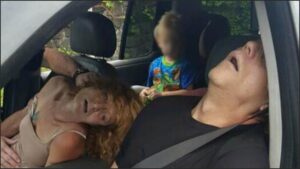
by James A. Bacon
Governor Glenn Youngkin has told Southwest Virginia law enforcement officials that he would sign a bill charging drug dealers with homicide if they sold illegal drugs that resulted in an overdose death.
With the number of fatal overdoses exceeding 100,000 a year across the U.S., drug addiction is a scourge in Southwest Virginia. Washington County Sheriff Blake Andis says that fentanyl causes at least two overdoses per week in his county. The fentanyl epidemic, he told the Bristol Herald Courier, is worse than the oxycontin epidemic. Southwest Virginia law enforcement officials believe the prospect of murder charges might deter drug dealers from selling fentanyl.
A bill that would charge drug dealers with homicide passed the General Assembly in 2019 but was vetoed by former Governor Ralph Northam. According to media reports at the time, under Virginia law a drug dealer could be charged in the death of a customer only if the overdose happened at the time and place of the deal. There was usually a time lapse between the purchase of a drug and the overdose, so the law almost never applied.
In his veto message, Northam said, the bill “would expand the law to hold a person liable for felony murder without regard to whether the overdose was connected by time and place to the underlying felony. Essentially, a person would be criminally liable for murder even if the overdose occurred days or even months after the deceased received the drugs.”
Yeah, that’s pretty much the idea. That’s a feature, not a bug.
Northam added, “We must continue to focus on the biological, psychological, and social factors that foster addiction.” (See his full statement below.)
This is gibberish. Who was Northam even referring to? Was he referring to the overdose victim? I doubt addiction counseling services are going to do someone much good when he’s already dead from a friggin’ fentanyl overdose.
Or was Northam suggesting that drug dealers need addiction services, perhaps on the grounds that dealers often are addicts, too? That interpretation is even more absurd than the first. I don’t care if drug dealers struggle with drug addiction themselves. They bear responsibility for selling the drugs knowing full well that overdose is a risk.
My primary concern with the proposed legislation — which Northam might have been alluding to in his statement but did not say so explicitly — is proving that the drugs sold by a dealer were responsible for a buyer’s death. How does one establish that fact legally? How can it be proven that the buyer hadn’t bought the fatal drugs from someone else in the intervening time? Before endorsing the bill, I would like to be assured that safeguards are built into the law to address this issue. Drug dealers may be scum, but even they have due-process rights.
Assuming that the connection between a drug sale and an overdose can be established, I have no qualms about charging drug dealers with murder. If the prospect of being charged with homicide would give dealers second thoughts about lacing less potent drugs with fentanyl, I’m OK with that. But deterrence is a secondary issue: I deem it a moral imperative to hold dealers accountable for their actions.
The COVID epidemic, which has caused more than one million total deaths in the United States, prompted lockdowns and rules that turned the entire country upside down. The overdose epidemic has not claimed as many victims, but it is ongoing. There is no sign of respite. As a society, what have we done aside from wringing our hands? Precious little that I can see. I find the disparity in responses to be quite extraordinary.
If the homicide-charges-for-drug-overdoses bill has legal imperfections, fine, let’s address them and get the damn thing passed. The bill won’t stop the overdose epidemic, but it might put a dent in it. Without question, it will send a unmistakable message that Virginia is serious.
Northam’s full 2019 veto statement
“Pursuant to Article V, Section 6, of the Constitution of Virginia, I veto House Bill 2528. This bill would hold a person who gives, manufactures, sells, or distributes a Schedule I or Schedule II controlled substance liable for a crime of felony murder when a recipient of the controlled substance dies as a result of an overdose, resulting in a sentence of five to 40 years in prison. The person would still face a charge of distribution of the controlled substance, subject to a penalty of five to 40 years imprisonment. Currently, under Virginia law, a person is liable for felony murder if in the manufacture, possession, or distribution of a Schedule I or Schedule II controlled substance, another person dies, if that death is connected in both time and place to the underlying felonious conduct. This legislation would expand the law to hold a person liable for felony murder without regard to whether the overdose was connected by time and place to the underlying felony. Essentially, a person would be criminally liable for murder even if the overdose occurred days or even months after the deceased received the drugs. The disease of addiction has long devastated our communities. While I share the goal of addressing the opioid crisis and ensuring drug dealers are punished for supplying dangerous drugs, this bill goes beyond drug dealers and would punish individuals who are themselves struggling with addiction. The way to help individuals struggling with addiction is to ensure they receive proper treatment. We must continue to focus on the biological, psychological, and social factors that foster addiction so that those factors can be addressed and mitigated in order to save Virginia’s families and communities from the destruction of drug addiction. Accordingly, I veto this bill.”

Leave a Reply
You must be logged in to post a comment.